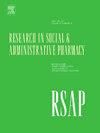信念和健康知识对老年人用药相关结果的影响:一项横断面研究。
IF 2.8
3区 医学
Q1 PUBLIC, ENVIRONMENTAL & OCCUPATIONAL HEALTH
Research in Social & Administrative Pharmacy
Pub Date : 2024-10-10
DOI:10.1016/j.sapharm.2024.10.003
引用次数: 0
摘要
背景:老年人通常患有多种慢性疾病,因此需要使用多种药物。然而,如果用药不当,他们也会面临更高的伤害风险。研究表明,社会经济劣势、信仰和健康知识可能与不坚持用药和用药不当有关。然而,在目前的文献中,老年人的代表性不足:调查信念和健康素养对老年人用药相关结果的影响:方法:邀请居住在社区的≥65 岁的参与者完成一项调查。受试者需报告人口统计数据、用药情况并完成三份问卷:适当用药自我效能量表(SEAMS)、药品信念问卷(BMQ)和健康素养问卷(HLQ)。计算了描述性统计、回归和相关性:共有 154 名参与者参与了分析(35.7% 为男性,年龄在 65-110 岁之间)。SEAMS平均分为33.2分(满分39分)(标准差(SD)=8.0),反映出坚持治疗的自我效能较高。调查中测量的四个量表(量表 1、5、6 和 9)的 HLQ 平均得分都很高。62 名参与者(44.0%)使用了五种或五种以上的药物(多药联用),18 名参与者(15.4%)报告使用了可能不适当的药物。在信念方面,BMQ 的具体平均得分如下:必要性得分 17.5(标准差 = 5.1),顾虑得分 12.0(标准差 = 4.0),表明对药物必要性的信念很强,顾虑很少。回归分析结果表明,以 BMQ-必要性得分作为自变量时,多药行为与 BMQ-必要性得分之间存在统计学意义(p 结论:BMQ-必要性得分与多药行为之间存在统计学意义(p):认为药物必需的老年人更倾向于报告使用多种药物,从而导致多药滥用。此外,对药物必要性有更坚定信念且健康知识水平较高的老年人在坚持用药方面表现出更强的自我效能。医疗专业人员应考虑评估老年人对药物必要性的信念,以控制潜在的不依从性,降低多重用药的风险,从而减轻次优用药的风险。本文章由计算机程序翻译,如有差异,请以英文原文为准。
The influence of beliefs and health literacy on medication-related outcomes in older adults: A cross-sectional study
Background
Older adults often manage multiple chronic diseases which necessitates the use of multiple medicines. Nevertheless, they also face an elevated risk of harm when medicines are used inappropriately. Studies indicate that socioeconomic disadvantage, beliefs, and health literacy may correlate with non-adherence and inappropriate medicine use. However, older adults are underrepresented in the current body of literature.
Objective
To investigate the influence of beliefs and health literacy on medication-related outcomes in older adults.
Methods
Participants ≥65 years living in the community were invited to complete a survey. Participants were asked to report demographics, medicines and complete three questionnaires: Self-Efficacy for Appropriate Medication use Scale (SEAMS), Beliefs about Medicines Questionnaire (BMQ) and Health Literacy Questionnaire (HLQ). Descriptive statistics, regressions and correlations were calculated.
Results
A total of 154 participants were included in the analysis (35.7 % male, age range 65–110 y). Mean SEAMS score was 33.2 out of 39 (standard deviation (SD) = 8.0), reflecting high self-efficacy for adherence. Mean HLQ scores were high across the four scales measured in the survey (scales 1, 5, 6, and 9). Sixty-two participants (44.0 %) were using five or more medicines (polypharmacy) and 18 (15.4 %) reported use of a potentially inappropriate medicine. Regarding beliefs, mean BMQ-specific scores were as follows: necessity score 17.5 (SD = 5.1) and concern score 12.0 (SD = 4.0), indicating strong beliefs in the necessity of medicines and few concerns. Results of the regression analysis indicated that where the BMQ-Necessity scores were employed as the independent variable, there was statistical significance with polypharmacy (p < 0.001). Additionally, moderate positive correlations were identified between (1) necessity beliefs and both polypharmacy (r = 0.401, p < 0.001) and adherence (r = 0.477, p < 0.001), and (2) adherence and HLQ scale 5 (r = 0.343, p < 0.001), scale 6 (r = 0.326, p < 0.001) and scale 9 (r = 0.320, p < 0.001).
Conclusion
Older adults who perceive their medicines as necessary are more inclined to report use of multiple medicines, leading to polypharmacy. Additionally, older adults with stronger beliefs in the necessity of medicines and higher levels of health literacy demonstrate greater self-efficacy for adherence. Health professionals should consider evaluating necessity beliefs in older adults to manage potential non-adherence, reduce the risk of polypharmacy, and thereby mitigate the risk of suboptimal medicine use.
求助全文
通过发布文献求助,成功后即可免费获取论文全文。
去求助
来源期刊

Research in Social & Administrative Pharmacy
PUBLIC, ENVIRONMENTAL & OCCUPATIONAL HEALTH-
CiteScore
7.20
自引率
10.30%
发文量
225
审稿时长
47 days
期刊介绍:
Research in Social and Administrative Pharmacy (RSAP) is a quarterly publication featuring original scientific reports and comprehensive review articles in the social and administrative pharmaceutical sciences. Topics of interest include outcomes evaluation of products, programs, or services; pharmacoepidemiology; medication adherence; direct-to-consumer advertising of prescription medications; disease state management; health systems reform; drug marketing; medication distribution systems such as e-prescribing; web-based pharmaceutical/medical services; drug commerce and re-importation; and health professions workforce issues.
 求助内容:
求助内容: 应助结果提醒方式:
应助结果提醒方式:


